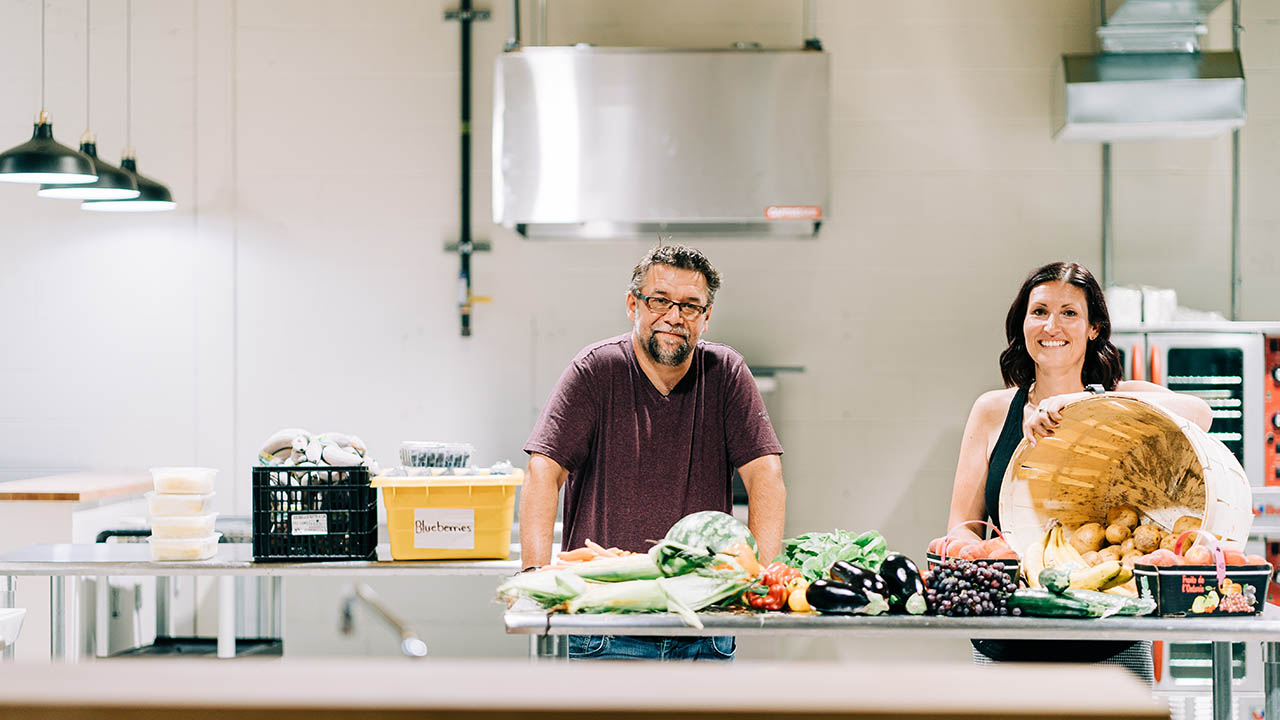LCF announces over $1 million in community project grants
 CREDIT: COURTESY OF LONDON COMMUNITY FOUNDATION
CREDIT: COURTESY OF LONDON COMMUNITY FOUNDATIONGlen Cairn Executive Director Stanislav Rajic and Basic Needs Coordinator Jazz Walmsley in the Glen Cairn kitchen.
The five recipients of the London Community Foundation’s Community (LCF) Vitality Grant were chosen after a long deliberation process by a panel of community volunteers. The projects selected were announced earlier this week.
Projects needed to demonstrate a commitment to collaboration and tackle a need identified in the LCF’S Vital Signs report.
The five recipients of the grants and the projects being worked on are:
- Pathways Employment Help Centre and Chippewas of the Thames First Nation – Building New Futures Together
- London Cares Homeless Response Services – Permanent Supportive Housing Program for Housing Deprived
- CMHA Thames Valley Addiction and Mental Health Services – Community Outreach and Support Team (COAST)
- Glen Cairn Community Resource Centre (GCCRC) – Food for All project
- Southwest Ontario Aboriginal Health Access Centre (SOAHAC) – Minomode-zewin nunge-gehwin “Healthy ways of eating”
“A lot of community foundations have certain streams of grants, certain areas that they grant to…Unrestricted granting gives us the ability to grant to areas that are most pressing in our community, their innovative projects that wouldn't be possible without unrestricted support.”
Pathways Employment Help Centre, who intends to use the $342,000 grant to teach 20 residents of the Chippewas of the Thames First Nation how to construct homes for single adults.
Chief of the Chippewas of the Thames First Nation, Jacqueline French, spoke about how the community appreciated the opportunity afforded by the grant.
“[The program] gives them the opportunity to see themselves in building these homes for members of their community,” French said. “It may end up that they’re building these homes, where it’s their family members that are moving in.”
London Cares will receive $350,000 over three years in order to combat the growing number of people facing homelessness in London. Anne Armstrong, the executive director, explained how they intend to use the grant.
“Our project is to create supportive housing for those with the most complex needs, who most typically can’t get housed with private market housing,” Armstrong said. “And this grant is going to be able to let us support with overnight staffing, which is a very rare commodity in service delivery.”
The Southwest Ontario Aboriginal Health Access Center (SOAHAC) plans to use the $135,016 to expand their pilot project aimed at addressing food insecurity for urban Indigenous families.
“We’re looking at using food as a means of healing and reconciliation, and also reconnection to culture,” Jocelyn Zurbrigg, a dietitian with SOAHAC, explained. “We’ve developed a very lovely relationship with the Indigenous Health Lab at Western and we have some colleagues who are going to help us with collection of data in a very unique way.”
Glen Cairn Community Resource Centre’s Food for All project plans to provide healthy and culturally appropriate food to communities in London.
“We want to instill that they have the opportunity to have nutritious and valuable food versus it just being a prepackaged container for them without the choice,” Jazz Walmsley, the Coordinator for Basic Needs at Glen Cairn, said on the project, which will be receiving $118,984 over the next three years.
Lori Griffith, Director of Crisis and Access at the Canadian Mental Health Association (CMHA), explained how the program is a collaboration between CMHA, St. Joseph’s, Middlesex-London Paramedic Service, and the London police service.
“COAST provides early and proactive intervention, de-escalation and safe transition to appropriate healthcare settings for individuals at risk of crisis through compassionate trauma informed responses with the goal of reducing police led interactions in these situations.”
CMHA will be receiving $138,000 to expand its Community Outreach and Support Team (COAST) program, which was started as a pilot in 2021.
















